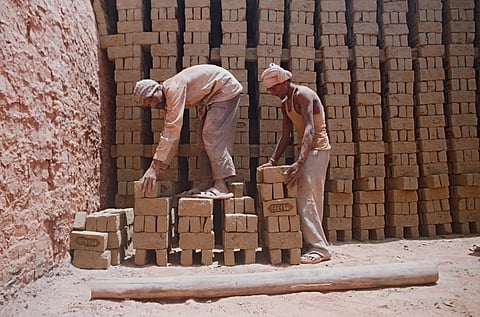Despite serious implications associated with brick kiln work, the issue remains largely overlooked in policy discourse
In India, brick kilns are typically located in rural areas and the outskirts of towns and cities, often operating in shadow. According to an International Labour Organization report, the brick manufacturing sector in India is highly labour-intensive and recognised as dangerous and hazardous, employing an estimated 10 million workers. The kiln sites are highly concentrated in north Indian states like Uttar Pradesh, Bihar, West Bengal, Rajasthan, and Gujarat.
The production process remains largely manual, with minimal mechanisation. Most brick kiln workers are seasonal migrants who relocate to kiln sites for six months or more. These migrations frequently cut across state boundaries and often involve entire families. In some cases, children migrate alone to kilns, placing them at heightened risk of exploitation and harm. Migration to kiln sites is often driven by acute poverty and the lack of livelihood opportunities in their native areas. When not employed in kilns, these individuals often work as agricultural labourers.
They predominantly belong to socio-economically marginalised communities such as Scheduled Castes (SCs) and Scheduled Tribes (STs) and come from some of the most socioeconomically disadvantaged regions of the country. As such, they represent one of the most vulnerable and exploited groups within the informal labour sector, often considered as modern-day slaves.
Working conditions in brick kilns are extremely harsh. Labourers routinely endure workdays stretching up to 16 hours for minimal wages, often while living in poor and unsafe conditions. The growing demand for bricks in the construction industry compels workers to labour intensively, often under pressure from kiln owners or contractors. Many workers are trapped in the cycle of debts, which they are unable to repay, placing them in situations of bonded labour.
These precarious working and living conditions have severe consequences for the health and well-being of kiln workers, including women and children. They face elevated risks of respiratory infections, skin diseases, musculoskeletal disorders, physical injuries, and chronic exposure to dust and air pollution. Children are particularly vulnerable due to their underdeveloped immune systems and growing bodies.
Women face compounded health challenges—not only they struggle to access adequate healthcare, especially during pregnancy and post-partum period, but they also bear the brunt of domestic responsibilities, adding to their physical burden and further deteriorating their health. Women also experience physical and sexual abuse in brick kiln sites. Moreover, the growing impact of climate change and extreme heat at kiln sites further aggravates the health risks faced by this already vulnerable population.
Despite the serious implications associated with this work, the issue remains largely overlooked in policy discourse—primarily due to a lack of comprehensive evidence. A more context-specific and deeper understanding of the informal nature of the brick kiln economy and the associated social and health vulnerabilities is essential to inform targeted policies and interventions aimed at reducing the risks and improving the well-being of this population.
The plight of brick kiln workers in India reveals a profound failure of labour regulation, social protection, and human rights enforcement. Although India has several laws to protect kiln workers, including the Minimum Wages Act (1948), the Bonded Labour System (Abolition) Act (1976), Inter-State Migrant Workmen Act (1979), they remain vulnerable. Most of the laws and regulations are not followed in this industry due informal nature of the work. A stricter enforcement of these laws and regulations are necessary to protect their rights.
Pintu Paul is an Assistant Professor at Indian Social Institute, New Delhi
Views expressed are the author’s own and don’t necessarily reflect those of Down To Earth

